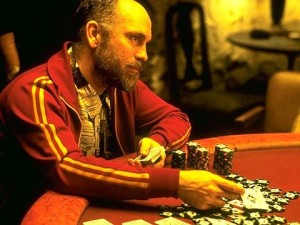[Spoiler alert for the movie Rounders (1998)]
 In the movie Rounders, staring Matt Damon, John Malkovich and Edward Norton, the character played by Matt Damon (Mike McDermott, from now on Mike) is a law school student who is paying his tuition with money he makes out of playing poker. His friendship with the character played by Edward Norton get’s him in debt with a russian mafia boss played by John Malkovich (Teddy KGB, from now on KGB), who also likes playing poker (and is really good at it). Mike has one night to raise up 15K dollars, or else… well you can imagine. He is lent 10K, so he’s still 5K short.
In the movie Rounders, staring Matt Damon, John Malkovich and Edward Norton, the character played by Matt Damon (Mike McDermott, from now on Mike) is a law school student who is paying his tuition with money he makes out of playing poker. His friendship with the character played by Edward Norton get’s him in debt with a russian mafia boss played by John Malkovich (Teddy KGB, from now on KGB), who also likes playing poker (and is really good at it). Mike has one night to raise up 15K dollars, or else… well you can imagine. He is lent 10K, so he’s still 5K short.
Here is the thing: what he decides to do is go to KGB’s place and play him for the remaining 5K. Mike manages to beat KGB enough to be able to pay his debt with him and return the 10K he had borrowed (he even has some extra left). As Mike is gathering up his things to leave, KGB is not happy with having lost and want’s a rematch, so he starts mocking Mike up to the point where he decides he’s going to play KGB all the way. Don’t get me wrong, this is a great movie, but there’s something very wrong with the situation I’ve explained in this paragraph, and you know you have a good strategical mind if you have already found out. Before I reveal what it is, here’s the video of the scene so you can try to figure it out one last time if you haven’t already:
So what is it? Sun Tzu, in his treatise The Art of War, lists the five “essentials for victory”, but the first is probably the most important:
Thus we may know that there are five essentials for victory:
1) He will win who knows when to fight and when not to fight.
…
This rule is broken right off the bat when KGB accepts to play Mike. As he does, he loses 5K, because his best-case scenario is to beat Mike and only be able to keep his 10K (which was going to be his in the morning anyway) and then have Grama (one of his thugs) kill him (or whatever mobsters do to guys who owe them money and don’t pay in time).
So, had you figured it out? If you’re really good, you not only spot these situations when you’re told to look out for them or are making a active effort to do so, but instead an alarm automatically triggers off in your head when you see one (in line with what Daniel Kahneman, author of “Thinking, Fast and Slow“, would call expert intuition).

